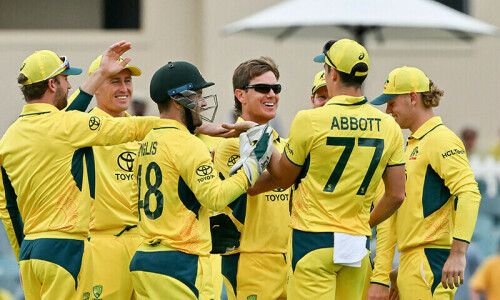
GENEVA: The United Nations has urged Fifa to allow Islamic women players to wear a hijab headscarf.
The UN says Wilfried Lemke, sports adviser to Secretary-General Ban Ki-moon, has written to FIFA President Sepp Blatter backing a proposal being considered at a meeting on Saturday.
Lemke writes that “FIFA has the responsibility to ensure that everyone has an equal chance to participate in football.”
FIFA outlawed hijabs for safety reasons in 2007, and allowed a cap which some players object to because it exposes their neck.
The Asian Football Confederation (AFC) has also sought Sepp Blatter's support in overturning the ban.
In a letter written to the FIFA boss, AFC acting president Zhang Jilong pitched for a favourable reconsideration of the issue when it is reviewed by the International Football Association Board (IFAB) in London.
“It is our beholden duty to make the game accessible to everyone across the globe and I request you to throw your weight behind this righteous cause,” China's Zhang wrote.
While Olympic sports such as rugby and taekwondo allow Muslim women to wear the headscarf in competition, soccer remains against its use, citing safety concerns.
Last year the women's soccer team from Iran were prevented from playing their 2012 Olympic second round qualifying match against Jordan because they refused to remove their hijabs before kick-off.
Iran, who had topped their group in the first round of Olympic qualifiers after going undefeated, were given 3-0 defeats as a penalty which abruptly ended their dreams of qualifying for the London Olympics.
IFAB, founded in 1886, is soccer's ultimate law-making body comprising four members from FIFA and four from the British associations.
FIFA vice-president Prince Ali Bin Al-Hussein of Jordan will present the case for allowing players to use a Dutch-designed Velcro hijab which comes apart if pulled.
“During its meeting last November, the AFC executive committee shared the concerns raised by the AFC women's committee over the hijab issue and consequently a workshop was held under the stewardship of Prince Ali to come up with a worldwide solution,” Zhang added in the letter.
“Though I fully understand the safety concerns and am in agreement that the well-being of the players is of paramount importance, I also believe that newly designed hijabs address this aspect in its entirety.”
FIFA’s rules panel meets in England, and will receive a presentation from FIFA vice president Prince Ali of Jordan to allow a headscarf held in place by a Velcro fastener.













































